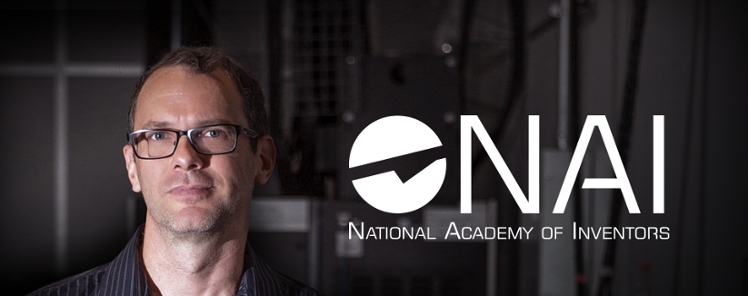EST&P Professor Jay Whitacre Named Fellow of the National Academy of Inventors

Jay Whitacre, professor of engineering and public policy, materials science and engineering, and teaches EST&P core course 'Energy Policy & Economic' has been named a 2015 Fellow of the National Academy of Inventors (NAI). The NAI Fellows Induction Ceremony will be held on April 15, 2016, at the United States Patent and Trademark Office in Alexandria, Virginia.
To be named a Fellow of the National Academy of Inventors, a nominee must be named an inventor on at least one patent issued by the United States Patent and Trademark Office and must be affiliated with a university, government or nonprofit research institute, or other academic entity. The NAI Fellows Program represents more than 400 inventors worldwide, and between them, the Fellows have been issued nearly 14,000 patents. This renowned program is a high professional distinction, and with Whitacre’s induction, Carnegie Mellon University is honored to have five NAI Fellows among its faculty.
“This is an amazing honor, and I’m thrilled to see NAI recognize the importance and impact of energy technology innovations as they look to recognize inventors.”
Whitacre has more than 30 patents issued or pending, has authored or co-authored more than 60 peer-reviewed papers, and has been recognized with numerous awards, including the 2015 Lemelson-MIT Prize, which “honors outstanding mid-career inventors improving the world through technological invention and demonstrating a commitment to mentorship in science, technology, engineering, and mathematics (STEM).”
In addition to his numerous other achievements, Whitacre founded the startup Aquion, which markets his invention, the Aqueous Hybrid Ion (AHI™), an environmentally friendly, sustainable, and inexpensive saltwater battery. The AHI™ uses its unique saltwater composition to store solar and wind energy for residential and off-the-grid applications. Nicknamed the “edible battery,” this energy storage system has such a minimal environmental impact that it is non-toxic if ingested.
The National Academy of Inventors Fellows Selection Committee has chosen Whitacre for induction as he has “demonstrated a highly prolific spirit of innovation in creating or facilitating outstanding inventions that have made a tangible impact on quality of life, economic development, and the welfare of society.” In addition to Whitacre’s focus on sustainability and environmental friendliness, Aquion is involved in several programs that introduce students, particularly young girls, to science, technology, engineering, and math (STEM) fields.
Whitacre, who will be formally inducted in 2016, joins Carnegie Mellon University faculty Krzysztof Matyjaszewski, José F. Moura, Raj Reddy, and President Subra Suresh in obtaining this prestigious title.
See more at: http://engineering.cmu.edu/media/feature/2015/12_15_whitacre_nai.html#sthash.5BZLbtYB.dpuf